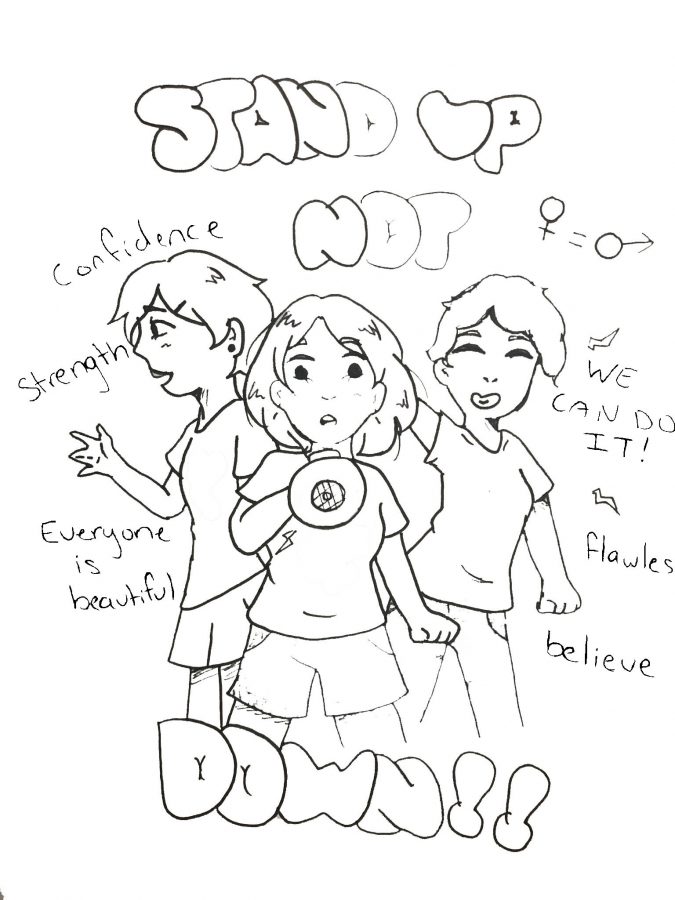By Valerie Velazquez ’20

At least 470,000 people assembled less than 24 hours after President Donald Trump’s inauguration to protest numerous issues concerning women’s rights in light of his problematic campaign for the presidency. According to the New York Times, crowd scientists deduced that the number of people who marched in Washington D.C. was roughly triple of those attending the inauguration.
shouldConcerns surrounding feminism were present prior to the Women’s Marches; however, the publicity around the marches has newly sparked them. Many of us are now asking ourselves questions in light of the heated debates around feminism, women’s rights and the patriarchy. Even if one believes oneself to be well informed, the question we all eventually ask ourselves when thinking about feminism is, “Am I a feminist?” Issues such as abortion are blurring the line for many people as to what a feminist believes in or what a feminist
believe in, making the answer to that question more complicated.
Abortion has been a huge topic, and it is bound to come up when discussing feminism. Since Planned Parenthood was one of the biggest supporters and sponsors of the Women’s March, many women against abortion felt unsure about attending, despite the fact that they agreed with many other issues concerning women’s rights. All women should individually have the right to choose abortion over an emotionally painful and unwanted pregnancy, especially since the choice to have a baby is one that affects the mother and the child’s future. Feminism supports the right of each woman to autonomously make decisions as to what to do with her body and health; not her husband, her partner, her parents and especially not the government. Being against abortion is still accepted since everyone is entitled to his or her own opinion; however, no one should force their opinion on someone else, especially when multiple lives are at stake.
Feminism is also criticized for the exclusion of the transsexual community, ignoring trans women’s issues or blatantly not recognizing trans women as women. Some people consider themselves feminists, but they ignore the trans community because they believe that trans women who one were once considered men are exempt to issues concerning women. However, the more people who identify as feminist and support trans women, the quicker this ignorance can go away.
Additionally, the title of “feminist” has been called into question as to what that entails and how effective it really is for the future of women’s rights. Public figures like Kellyanne Conway, the first female campaign manager to win a U.S. election, and celebrities like Kelly Clarkson have made their stance against feminism clear. One of the main concerns that these women and many others have about feminism is that it could foster a society where women are overly dominant and men are considered inferior or worthless.
“I’m not anti-male. One does not need to be pro-female and call yourself a feminist, when with it comes the whole anti-male culture where we want young boys to sit down and shut up in the classroom,” Conway said in an interview with the Washington Post.
However the issue of women overly dominating society in the same way men have been for thousands of years should not stop one from supporting feminism because the problem itself does not exist. The goal of feminism is not to put women above men; it is to equal the playing field. The idea of “sit down and shut up” is not as related to men as depicted in Conway’s quote. Women have been shut up for the vast majority of history, whether it has been in their marriages, classrooms or in front of the Senate like Elizabeth Warren. The feminism movement is meant to make up for the women who did not get a chance in history and to make the future more inclusive.
Some prefer to pivot to identifying as “humanist” or choosing another way to avoid being directly called a feminist. Though being a humanist seems appealing, it is essentially avoiding differences in opinion with those who avidly disagree with feminism. The point of calling oneself a feminist is to be confident in one’s decision to be fully supportive of women. The word feminist is supposed to be a harsh word. It is supposed to be strong and provoke confidence in those who embrace it, and in a way it is meant to intimidate. However the harsh stereotypes identifying feminists as power hungry women who do not have children, take extreme measures and burn bras do not define the aspects of feminism. Feminism is the opinion that both men and women should have equal opportunities in the world.
It is hard to believe that the world is still faced with such a primitive issue since many of us like to believe that our generation is miles above the past in terms of human and especially women’s rights. Though it is true that women’s rights have improved greatly during our lifetimes, it is incredibly important to remember that there is still a huge amount of work to do in order to fully achieve acceptance and equality for all women. Yet this should not discourage people; instead, that makes it all the more urgent for gender inequality to be resolved. If we see ourselves as the future of America, and representatives of the free world, we need to be able to embrace the challenge and not flee from conflict. Feminism at its core is not a hard concept to accept because in theory, as long as one believes in women’s rights, they should be considered a feminist. However it is the stereotypes and stigmas against feminism that discourage people from fully embracing it. In reality, taking the leap of faith to call oneself a feminist is the easiest risk one will ever take.




